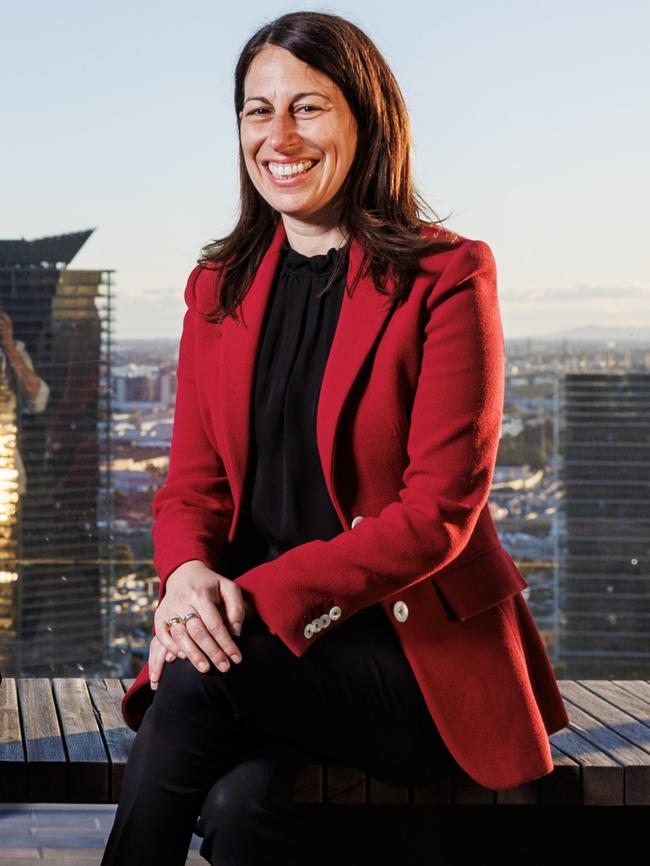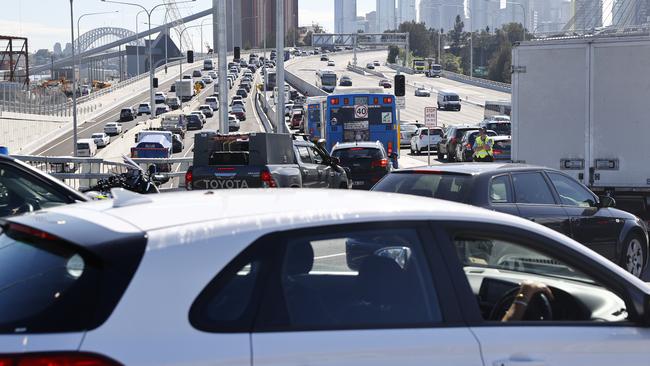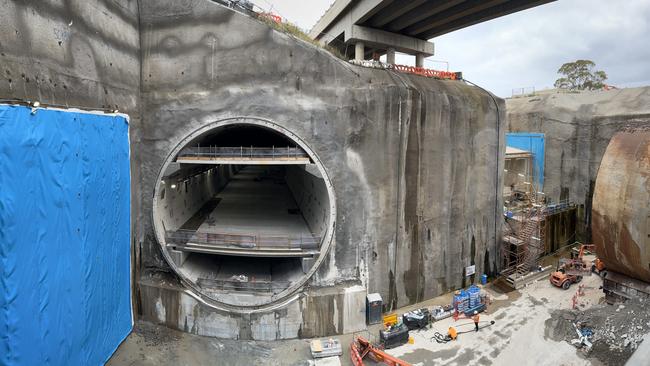Why this toll road boss is facing a reputational crash
From Rozelle Interchange to price hikes, there’s a backlash brewing for new Transurban chief executive Michelle Jablko.
Business
Don't miss out on the headlines from Business. Followed categories will be added to My News.
Rozelle Interchange chaos; drivers hurting from price hikes; half of Melbourne’s inner west under extended construction; and a looming shake-up tolls in NSW.
Add into the mix a possible competition roadblock for the East Link buyout and years of upheaval for the M7 widening. Then there’s the rickety surface of Sydney’s M2 toll road that long eluded a quick fix.
There’s a lot that can go wrong in a short space for new Transurban boss Michelle Jablko.

The money-machine for Transurban might be humming along with revenue up 6.3 per cent thanks to toll hikes and headline profits surging to $230m in the December half, but the reputational issues are beginning to form gridlock around Jablko.
If not handled with care, this could move Transurban up closer into the Qantas zone of a reputational shock. And that ended badly for the airline’s management and investors.
Former chief financial officer Jablko only took charge from long-serving boss Scott Charlton last October and the problems she inherits may have been slow moving, but they have come together quick. The risk for Jablko is collectively the public backlash could overwhelm Transurban. Like the supermarkets, this could invite deeper regulatory scrutiny from the competition regulator or even state governments unwilling to play ball in the future.
Jablko has a head start after living through the experience of reputational shocks. She was chief financial officer at ANZ during the punishing financial services royal commission. It is from here she wants to take the lessons of banking to start put customers at the centre of the business – not just thinking about lumbering physical assets like roads.
Jablko is aware of the challenges and says Transurban needs to show it is about delivering value for drivers through faster travel times while helping to get big cities moving again. As part of the value push Transurban has recently launched its own loyalty program offering discounts and broader promotions. It has already racked up nearly 800,000 members.

Sitting at the very top of a growing list of problems for Jablko is the planning mess of the newly-opened Rozelle Interchange in Sydney’s inner west. And what a mess.
To be clear, the $4bn project was designed and built by the NSW government, with Transurban acquiring the labyrinth of tolled tunnels deep below the ground.
The NSW Government’s transport agency controls the problematic “surface roads” however, the interconnected roads and gridlock headache for residents around the site mean Transurban is being steadily dragged in to the fight.
Just in the past few days a NSW parliamentary inquiry was called into the planning woes of Rozelle and Transurban is expected to be called to give evidence amid claims it influenced the designed to benefit its own part of the concession. Jablko rejects this suggestion.
“I get it – it’s frustrating,” she tells The Australian. “I do know that there are delays for people on the nearby surface roads. “We are absolutely working hard with the government to try and ease things”.
This includes improving signage around the road and is also working on improving the “pinch points” where traffic merges between the tunnels and the surface roads. For all big complicated road projects, there they do take time to settle in, she adds.
She says there is another positive side to the Rozelle story with drivers using Transurban’s roads coming in from Parramatta or Penrith in the west saving a third of their previous commute time. This also counts for the drive home.
In Melbourne, Transurban’s home market, the massive $12bn West Gate Tunnel project that looks like a giant wound across West Melbourne and is scheduled to open late 2025. The scale of this build is enormous, and Jablko acknowledges there too could be teething issues as drivers start using it – although nothing on the scale of Rozelle. Transurban is the operator of West Gate with the Victorian Government a partner.
“Road networks are inherently interconnected and complex …. and all new infrastructure takes a little bit of time to get used to, but we’re working through right now with the government all the various connections to make this as successful as we can”.

Back in Sydney, the NSW Minns government is about to release the results of its inquiry into tolls and reforms. The recommendations won’t impact Transurban’s existing concessions but could influence the future design, potentially breaking the direct link between tolls hikes and inflation.
Transurban participated in the inquiry, arguing that toll roads were critical for mobility and speeding up construction. Jablko says there will be opportunity from the inquiry to find answers “that are good for Sydney and support our long term investments”. The toll road operator has invested $36bn across the city in the last few decades, she adds, making it the single biggest market.
Jablko points out infrastructure is a very long-term business and Transurban and toll roads have a role in easing congestion, particularly as the population grows.
“Over the next 20 years, we think the need for infrastructure is real. Also, there’ll be more traffic on our roads as a result,” she says.
And the M2? Jablko says the historical design issue is behind the long running tension that causing surface cracks. Transurban acquired the 21km toll road in 2005 and to comprehensive fix it would require stripping off and a rebuild of the entire roadway.
“We are doing work to improve parts. But we’re doing it in stages, in ways that we think will have the best outcome for customers,” she says.
johnstone@theaustralian.com.au
More Coverage
Originally published as Why this toll road boss is facing a reputational crash




